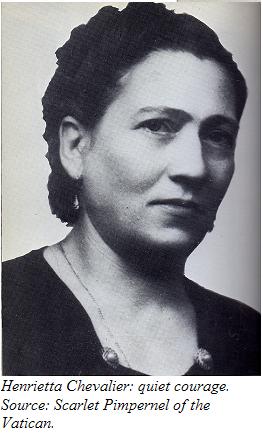
But the five-foot-four Mrs. Chevalier was not easily frightened. She took in those two refugees, and would host escaped soldiers throughout the war, sometimes as many as nine at a time in her two-bedroom apartment. If the accommodations were lacking in space, Mrs. Chevalier’s cooking more than compensated. Her daughters, ages twenty-one through thirteen at the time, were in charge of shopping and running errands, and keeping the escapees entertained. They recall playing gramophone records with the soldiers, and showing them around the sights of Rome, once the men had received forged papers that made it somewhat safe to go out. War or no, everyone managed to have fun.
The danger, however, was very real. SS troops would often conduct surprise raids of suspected properties. Several times, sympathetic neighbors warned the Chevaliers to send their soldiers out for a long walk and tidy away the extra mattresses and plates. Soon, rifle butts would crash against the door, troopers would march in, and the apartment would be thoroughly searched. Mrs. Chevalier would be calm, on one occasion sitting and darning socks for “her boys.”
Food and supplies were found by May. A circle of priests would deliver the supplies to the various billets every day, check up on the refugees’ welfare, and bring warnings if it were necessary to vacate the premises. In the middle of it all was O’Flaherty, ubiquitous Irish twinkle in his eyes, calmly doing whatever needed to be done while showing a complete disregard for the official curfew, the Fascist troops in the streets, the disapproval of Church officials, or anything else that might slow him down.
But perhaps what O’Flaherty was most known for disregarding were the distinctions that usually get drawn between different groups and nationalities during wartime. He would honestly help anyone who needed it. An old granary on the Vatican grounds once held a typical mix of refugees: fifteen American civilian travelers unable to get home, one American GI, two American airmen, eight British soldiers, one Irish Guardsman, several political fugitives, a Protestant clergyman from South Africa, and an Italian pilot who’d had to disappear because he’d flown Italian top brass to the surrender meeting. Communists from Yugoslavia showed up at the Vatican’s gates. So did Arabs who had been captured during Italy’s campaign in North Africa. O’Flaherty did what he could for them all.
It took a lot to make the monsignor choose sides. At the beginning of the war, O’Flaherty, with his childhood memories of British oppression, was often heard to say that he saw no real difference between the British and the Germans. “I used to listen to broadcasts from both sides,” he told a friend later, “All propaganda, of course, and both making the same terrible charges against the other. I frankly didn’t know which side to believe—until they started rounding up the Jews in Rome. They treated them like beasts, making old men and respectable women get down on their knees and scrub the roads. You know the sort of thing that happened after that…” Once he saw this, O’Flaherty came down on the side of the Allies. And in another of the great paradoxes of the Monsignor’s life, he, who had been so anti-British as a youth, actually ended up rescuing more British POWs in Italy than anyone else.